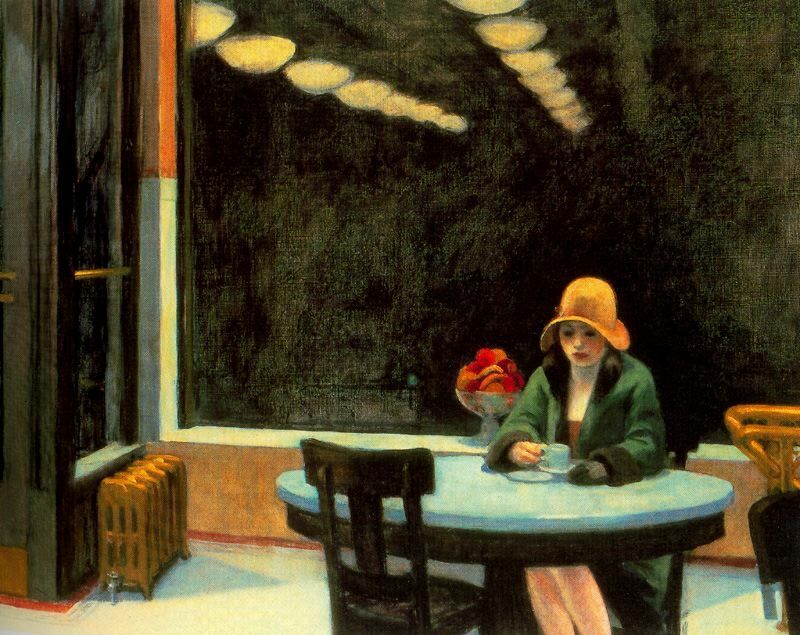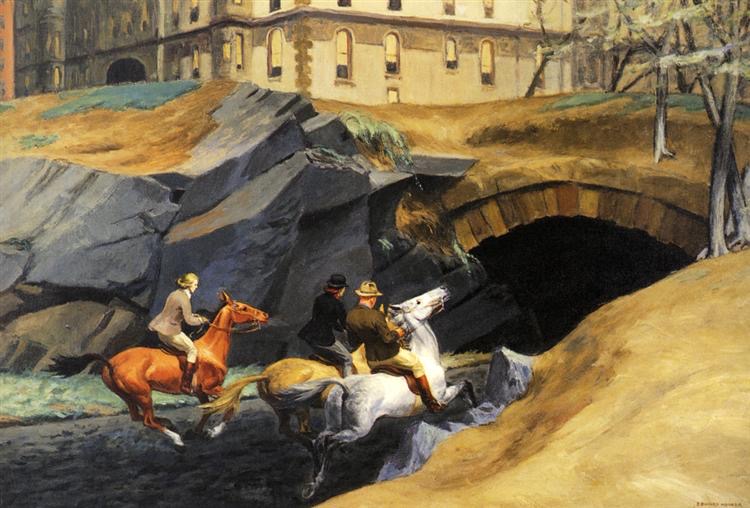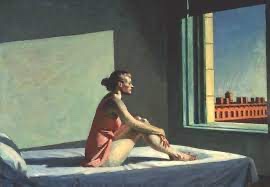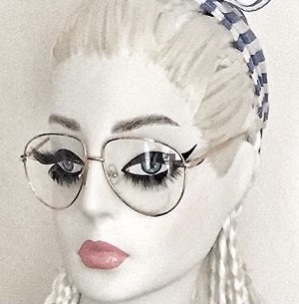Millie Haver loves her new life in the lights of the big city. Darkness lurks over her shoulder.
This story is inspired by Edward Hopper’s 1927 painting Automat. Enjoy!
Hiding in the Light
Bob Gillen
Friday night in the city. Coming up on midnight. On the street a taxi’s blaring horn shatters the stillness. Millie Haver sits alone at her usual corner table in the all-night Automat. Rows of ceiling lights in the cafeteria hold back the outside darkness. From the corner of her eye Millie can see pedestrians passing on the surrounding sidewalk. A few pause to stare in for a moment. Several couples walk past arm in arm. Most pass on by, even as they steal a glance at the lone woman in the cafeteria.
Millie maintains a deadpan expression on her face. She knows what most of the passersby think. A young woman, dumped by her boyfriend. Or an office worker laid off from her job. A woman at odds with the world. Or rather, a world at odds with this one woman.
Millie smiles to herself.
Only four months ago she sat crosslegged on the beach near her childhood home as the sun rose over the ocean. The day the sun infused her with courage. The day she decided to leave for the city. Life in her home town was over. She had performed in all the area shows. Tap danced till her feet bled. Taken home a shelf full of trophies and ribbons. And now, time to move on.
Millie is a dancer on the big stage. A Broadway dolly. Performing eight shows a week. Getting paid enough to eke out a life in the city. Tonight she had spent three nickels on an egg salad sandwich. Another nickel on a cup of coffee she would nurse for hours.
Millie loves life in the light. She glories in seeing her face in the light of a makeup mirror. Tapping under the hot stage lights. Looking out night after night into the blackness where her audience sits. She is a creature of light, that special theater light that separates performer from audience.
Tonight had been a good house. Standing ovation at the finale. One of the usual, posh, potbellied men had come backstage with roses. For any one of the dancers who smiled at him. Millie had turned away. He only wanted one thing. And she was not about to give it. Not to him.
Millie shares a tiny apartment with Maxine, another dancer from the show. Every night after their performance, Maxine headed straight for the apartment and bed. Not Millie. The apartment is dimly lit even on the brightest of days. Going home now would mean stumbling in the dark to avoid waking her roommate. Tripping over shoes and clothes. Rubbing her aching feet. Staring at the ceiling, waiting for dawn. For light.
Earlier today Millie and Maxine had taken a long walk to explore the Hudson River. Strolled out on an abandoned pier. Smelled rotten fish, garbage, sewage. Watched the currents carry the dirty water south to the ocean. It was chilly out on the river, with winter closing in. Glove weather. Maxine came up from Florida. She doesn’t know winter. Not yet.
Millie sees the Hudson as movement. Flow. A journey. Of course the river is filthy. But it’s part of the city. The city where stage lights can make even filth disappear. At least for a moment.
Sitting in the brightly lit cafeteria is a silent role Millie plays for herself, an attempt to continue her performance. This is her second stage. She can feel the audience behind her. Passing on the sidewalk. Illuminated briefly as they pass the large cafeteria windows.
Every night Millie is the lone woman in the window. The mysterious woman. Sitting at a table facing an empty chair. She does not throw her coat or purse on the empty chair. Leave it bare for people to wonder. Casting a shadow of curiosity to the outside world. Tonight she longs to take off her shoes, rub her sore feet. But that would not suit the image she cultivates.
Millie hears a shout from the front door. A man, hat and coat askew, staggers as he tries to enter the cafeteria. The cafeteria manager blocks his path.
The man turns and vomits on the sidewalk. He slips to the ground, clinging to a bottle in a brown bag.
The manager waves to an assistant. They lift the drunk and push him away. He screams at the manager as he sways down the sidewalk, grabbing for the support of a light pole.
Millie shudders. Trembles. Looks around for someplace to hide. Coffee sloshes from her cup. She squeezes her eyes shut.
Images flash in her mind. Her drunken father, raging in the dark, swinging a kitchen knife at her mother. Millie hiding behind a living room chair, hands over her ears. Her mother waiting for her husband’s rage to peter out. Taking the knife away from him. Steering him to bed. Millie falling asleep behind the chair.
She blinks. Looks up at the ceiling lights. Glances around the room. Quiet again. She hears nickels dropping in a slot. A small door clicking open to reveal a midnight snack. A few diners eating pie and sipping coffee.
She takes in a deep breath. Opens her eyes wide.
Light.
And with the light, peace.
***





Recent Comments